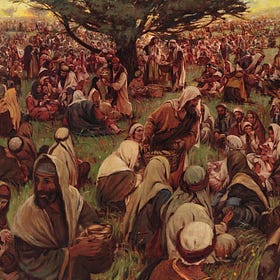On Self Care #1
Meditation on the Right Use of Vacation
“Because there were many people coming and going, the apostles did not even have time to eat. Jesus then said to them, ‘You should go away into a deserted place and rest for a while.’ They went away in the boat to a deserted place by themselves.”
— Mark 6:31–32
At first glance, this passage feels almost modern: a teacher dismissing his students, or a boss telling an overworked employee, “You need a vacation.”
The apostles had been working so hard that they barely had time to eat. Sound familiar? But note — Jesus does not send them to a villa or a bustling town. He sends them to a deserted place.
Shortly after this, following the Feeding of the Five Thousand, Jesus Himself retreats — “up the mountain to pray” (Mark 6:46).
On Food #1
In my journey toward understanding the origins of chaos, I’ve been drawn again and again to the most provocative — and often neglected — aspects of daily life: food, pleasure, conflict, desire. These are not minor concerns; they are where chaos most easily enters us, and where redemption is most needed.
There is, of course, a figurative message here — one could speak of the inner desert, the citadel of the soul, as the early Fathers often did. But I want to linger on the more literal meaning of vacation — to ask what it was originally meant to be, and what it has now become.
The word vacation comes from the Latin vacatio — meaning freedom, exemption, release from duty. In English, it long held this meaning: a time of stepping away, a reprieve.
But during the industrial era, the idea of vacation began to shift. Wealthy Americans popularized the notion of vacation as travel and leisure. Again — not a bad thing in itself. The trouble lies in what that leisure often becomes.
If you’re like me, you may find that vacations are frequently more exhausting than work: the late nights, the rushed itineraries, the overindulgence. The body may be removed from work, but the spirit is worn thin.
I’ve traveled to beautiful islands, beaches, and European cities — but I cannot recall many times I returned truly rejuvenated. More often, friends and I would say, “Now I need a real vacation.”
So what is a real vacation meant to do?
Today, we are told it should be a time to chase fun, to squeeze every drop out of freedom from the office. But Scripture suggests something different.
Vacation is meant to restore the soul — to send us back into the world with clarity, strength, and renewed purpose. It should be a time of quiet, of reflection, of spiritual re-centering.
That does not mean we must retreat to mountaintops or deserts — but perhaps our vacations should carry the spirit of such retreats. They should be disciplined, intentional, and nourishing to both body and soul.
I believe this is what Jesus modeled when He said, “Go away into a deserted place and rest for a while.”
Other Meanings:
Retreat into the inner desert: renounce the world for a time, fast, battle temptations, and cleanse the soul.
Use vacations to fuel labor: rest is not an escape, but a means to return stronger and labor more fruitfully.
Solitude restores best: “to a deserted place by themselves” — solitude renews us far better than constant crowds.
Spiritual Guides to Use During Vacation
The Ladder of Divine Ascent: This is a daily read for me. Written by St. John Climacus, it’s divided into 30 “steps” designed to guide the soul in rising above the flesh and living by the Spirit. It offers practical, often piercing wisdom on how to draw closer to God through struggle, humility, and prayer.
Philokalia Volume 1: A timeless collection of writings from the early Church Fathers — many composed in desert solitude or monastic silence. These texts offer deep instruction on purifying the heart, guarding the mind, resisting evil, and cultivating unceasing prayer. A perfect companion for retreat.
The Gospel: This one goes without saying. I bring an Eastern Orthodox translation of the New Testament, kept in a simple zipper case that makes it easy to travel with. No matter where I go, this is my anchor.




